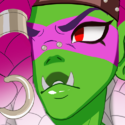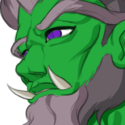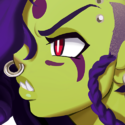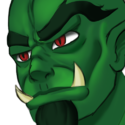Difference between revisions of "Orcs"
m |
m (→Characters) |
||
| Line 152: | Line 152: | ||
<tabber> | <tabber> | ||
Notable characters= | Notable characters= | ||
| − | + | {|class="table" style="margin-left: auto; margin-right: auto; border: 2px solid #929292; cellpadding:1px; " | |
| − | {|class=" | ||
|- | |- | ||
| − | |{{WikiHeadshot-index|name=Argoth}}{{WikiHeadshot-index|name=Arona}}{{WikiHeadshot-index|name=Grettel}}{{WikiHeadshot-index|name=Hretha}}{{WikiHeadshot-index|name=Infrith}}{{WikiHeadshot-index|name=Ogrish}}{{WikiHeadshot-index|name=Orc Thane | + | |{{WikiHeadshot-index|name=Argoth}}{{WikiHeadshot-index|name=Arona}}{{WikiHeadshot-index|name=Grettel}}{{WikiHeadshot-index|name=Hretha}}{{WikiHeadshot-index|name=Infrith}}{{WikiHeadshot-index|name=Ogrish}}{{WikiHeadshot-index|name=Orc Thane}} |
|- | |- | ||
| − | |{{WikiHeadshot-index|name=Ringren}}{{WikiHeadshot-index|name=Ronok}}{{WikiHeadshot-index|name=Rroljar}}{{WikiHeadshot-index|name=Solveig|text=(half-[[Lupines|lupine]])}}{{WikiHeadshot-index|name=Vaush}}{{WikiHeadshot-index|name=Ylvid}} | + | |{{WikiHeadshot-index|name=Ragnild}}{{WikiHeadshot-index|name=Ringren}}{{WikiHeadshot-index|name=Ronok}}{{WikiHeadshot-index|name=Rroljar}}{{WikiHeadshot-index|name=Solveig|text=(half-[[Lupines|lupine]])}}{{WikiHeadshot-index|name=Vaush}}{{WikiHeadshot-index|name=Ylvid}} |
| − | |} | + | |} |
|-| | |-| | ||
Generic characters= | Generic characters= | ||
| − | + | {|class="table" style="margin-left: auto; margin-right: auto; border: 2px solid #929292; cellpadding:1px; " | |
| − | {|class=" | ||
|- | |- | ||
| − | |{{ | + | |{{WikiHeadshot-index|name=Orc Amazon}}{{WikiHeadshot-index|name=Orc Apprentice}}{{WikiHeadshot-index|name=Orc Executioner}}{{WikiHeadshot-index|name=Orc Warrior}} |
| − | |} | + | |} |
</tabber> | </tabber> | ||
[[Category:Races]] | [[Category:Races]] | ||
Revision as of 17:39, 20 November 2024
"I am the chieftain. I am the tribe! By this axe, I rule!"
—Argoth of the Kervus Tribe, on slaying the first challengers to his throne
Writer Credit
| Savin |
|---|
|
Codex
Name: Orc (pl. Orcs)
Sexes: Male and Female
Height: Ranges from between 6 ft. and 8 ft. on average, with males standing taller than females.
Weight: Somewhat heavier than a human of the same size. Mostly due to additional muscle.
Skin: Orcs have normal skin, colored green, gray, or brown.
Hair: Fundamentally human-like. Blacks and browns are by far the most common, with red hair found in perhaps 10% of the population.
Eyes: Orcs have human-like eyes, with red, gold, or blue colors most common.
Ears: Orcs have slightly-tapered ears, similar to elves. The similarity is contentious for both races.
Lifespan: About 60 years.
Maturity: 16 years.
Description
Orcs are towering, muscle-bound brutes found throughout the continent and the islands of the northern archipelago. Orcs of both sexes are much larger than the average human, with rough green-to-brown skin, prominent tusks, and a natural musculature that leaves even an average orc appearing like a bodybuilder compared to a trained human fighter. Typically, orcs either have short hair or wear it heavily braided, and most men wear thick beards to compliment thick coverings of chest hair. Orcs of both sexes have a propensity for piercings and tattoos, and it's rare to find an orc without one or the other.
Male orcs stand taller than females, and on average are slightly stronger. They typically have thick pelts of body hair all over, especially on the chest and groin. Male orcs have large, thick penises, reaching up to 12" without going over the average.
Female orcs tend to be quite buxom, with most women easily reaching D-cups by their late teens. Even F-cup breasts can't be considered out of the ordinary, though most female orcs gifted with that much chest tend to take on more priestly roles, as even orcish war-straps cannot maintain control of them. Female hips and thighs tend to be quite broad as well, giving orc women a distinctive hourglass shape that, combined with their natural muscle and stature, has lead to them proudly bearing the title of "amazons" since ancient times.
Lips, nipples, and the female sex all tend to be black or very dark green in color.
Reproduction
Orcish reproduction is fundamentally mundane and human-like, with females becoming pregnant with usually one or two offspring and bearing them through an eight-month pregnancy. Mothers will nurse helpless young for a year or so before transitioning to solid foods — usually a game-heavy diet, as young orcs have an insatiable appetite for red meat.
Female orcs have a similar fertility cycle to human females, but orc males instead go through a cycle known as "rutting" roughly one week out of every three. During this period, males have noticeably increased aggression, libido, and sexual stamina — and, it's believed, virility is increased as well during this period, or at least the amount of effluvia released per coupling. Large groups of males in the same space, such as a war-camp, are proven to eventually all arrive on roughly the same cycle, as if they are biologically motivated to violently compete for mates.
Unlike with a female heat cycle, there is no natural preemptive end to orcish rut — even if every female in the camp is pregnant already, the males' heightened libido will keep them demanding sex as often and as hard as possible, leading to a great deal of either conflict or copulation when orcs are forced to remain together too long.
This synchronized period of vigorous rutting is commonly referred to as the "white week" by females in an orcish camp, no doubt due to their own appearance afterwards.
History
Orcs have relatively little history as recorded by Belharans: they have always existed on the fringes of imperial society, raiding and pillaging up and down the coastlands in their great longboats. No amount of conquest, garrisons, or missionaries have ever succeeded in tempering the orc tribes; even when thousands of orcs were enslaved by the empire and put to work in the mines and quarries of the south. If anything, this solution only introduced escaped orc populations to the area, causing mass interbreeding throughout small, underprotected villages. By modern reckoning, orcs are now thoroughly divided between islander and heartlander bloodlines.
Most scholars that have attempted to learn about island orc tribes up close have simply ended up being enslaved, or at best, getting an up-close experience of the "white week" before being sent back home gravid with orc-blood children. As such, orcs throughout history have generally been seen as nothing more than barbarians, wild and untamed folk that buck the yoke of civilization — and who pose an incessant danger to everyone around them.
Perhaps the only saving grace for the orcs of the northern isles is that, during the Godswar, they were forced by proximity to the island of Estelore to fight on the side of the Empire against the Wraiths. While never allied, strictly speaking, the island raiders did their part to disrupt the demonic navy and force the Wraiths' army to spread slowly across the land, rather than exploding across the sea in all directions.
Orcs living in the Belharan heartland are more pastoral and peaceful than their fierce island cousins. Typically of earth-toned skin and more human blood than their oceanic kin, these orcs were more successfully Belharanized during the empire's stewardship of the heartlands. After some effort from missionaries and the Imperial Legion, these tribes fully integrated into the empire, and found use as laborers and soldiers in the southlands.
With the empire's protections now gone, these peaceful tribes now find themselves prime targets for island orc raids. These orcs are held in contempt by their raider kin due to their agrarian lifestyle, often taunted with such phrases as "orcs do not sow, only reap." Humans and elves consider both bloodlines equally barbaric and backwards even now, struggling to tell one apart from the other.
Society & Culture
Orcs typically live in loose associations of families and friends. These tribes are ruled by a chieftain and supported by priests and enforcers, who help to direct the tribe on its raids. As far as imperial scholarship is concerned, all orcish tribes subsist at least in part by plundering other races' settlements (and, perhaps, those of other orcs).
Islander orcs do not build much of anything besides boats and fortifications, they do not smelt their own bronze, nor do they grow their own crops. Indeed, much of the maintenance of their lands is left to their slaves — those taken on raids, and their descendants kept on the islands for generations beyond counting. Freeholder orcs — those that own land on the islands, but are not chieftains of tribes — own few slaves, as they do little farming, but rather maintain the security of the tribes' hunting and gathering lands. All other members of the tribe follow their leader on raids, raise children, or learn one of the few trades common among their kind: the way of the priest or the way of the boat-maker.
Heartlander orcs on the other hand are fairly decent farmers, craftsmen, and brewers — though you would struggle to find an elven citizen who would admit they're more than barbarians in hiding. These orcs are typically literate and at least somewhat educated thanks to the missionaries that once frequented their lands, empowering the tribes' storytellers and priests to continue the tradition. Some of the strongest ales on the continent come from the heartland orcs, whether through trade with the remnant empire or by raids from their island kin.
Codex Acquisition
Codex entry is unlocked at the start of the game
Other Information
| Adjectives |
|
|---|---|
| Cute Adjectives |
|
Gameplay Attributes
| Starting Boost | Toughness +1
|
|---|---|
| Affinities |
Character Creation Options
| Sexes | Male |
|---|---|
| Female | |
| Height Range | 6'0"(72") to 8'0"(96") |
| Hair Colors |
|
| Eye Colors |
|
| Skin Colors |
|
| Cock Size Range | 6" to 12" |
| Tit Cup Size Range | C to F |
Transformatives
Characters
Argoth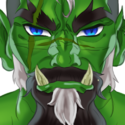 Arona Arona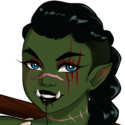 Grettel Grettel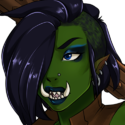 Hretha Hretha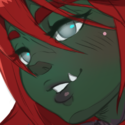 Infrith Infrith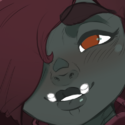 Ogrish Ogrish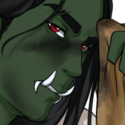 Orc Thane Orc Thane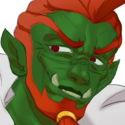
|
Ragnild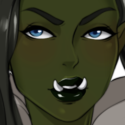 Ringren Ringren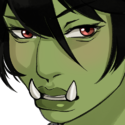 Ronok Ronok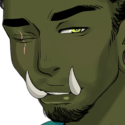 Rroljar Rroljar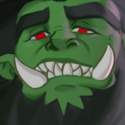 Solveig Solveig(half-lupine) 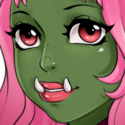 Vaush Vaush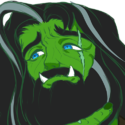 Ylvid Ylvid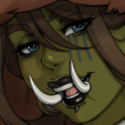
|
